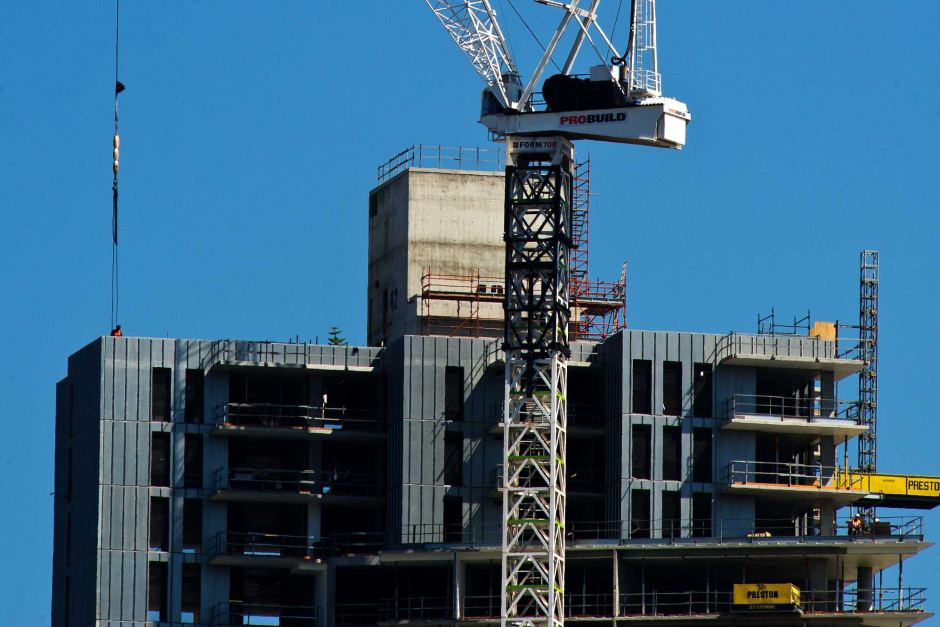Category: Building and Construction / Housing Industry / Economic Trends
Renewed apartment surge drives building approvals up
Tuesday, 30 Aug 2016 10:52:13 | Stephen Letts

Crane on apartment building construction site in Melbourne's Southbank area (date unknown) (ABC News: Peter Giafis)
A surge in new apartment plans has offset a decline in house approvals and driven the number of new building permits up by 11.3 per cent in July.
It was the biggest jump in monthly approvals in two-and-half-years and 21,000 approvals was the second-highest recorded since the Australian Bureau of Statistics started reporting the data in 2001.
In seasonally adjusted terms, the Australian Bureau of Statistics said apartment approvals jumped by 23 per cent for the month to 11,393, to be almost 16 per cent higher than a year ago.
However, the number of private sector house approvals edged down another 0.5 per cent and is now roughly 3 per cent lower over the year.
In trend terms, dwelling approvals were stronger in New South Wales and Victoria, up 2.4 per cent and 0.5 per cent respectively, but fell in the other states and territories.
The total value of buildings approved rose 3.2 per cent in July, while the value of residential building rebounded 6.2 per cent, having fallen in the previous two months.
The surge in apartment building - particularly in east coast capital cities - recently prompted investment banking giant Citi to warn that a building glut in the market was likely to trigger a drop in prices and bring the housing boom to an end.
Citi economist Josh Williamson noted that apartment numbers moved further above houses, extending the trend in the medium and high-density segment of the market.
"It also masked the emerging trend of gently falling owner-occupier approvals on the headline result," Mr Williamson said.
"In original (non-seasonally adjusted) terms the apartment increase was a very large 48 per cent in New South Wales, 30 per cent in Queensland and 34 per cent in Western Australia."
However, Mr Williamson said given the oversupply that was building up there was a growing risk a number of the approvals will not be turned into dwelling starts or will be delayed.
'Supply overrunning demand, rental inflation close to zero'
JP Morgan economist Tom Kennedy said the surge in apartments was way above expectations and has thrown a curve-ball at the economy.
"While the state level data are only disclosed in original terms, this boost appears fairly localized to where activity had already been concentrated, and is consistent with our view that the looming supply expansion, particularly in the higher-density sector, will exert downward pressure on prices," Mr Kennedy said.
"Although the composition of approval growth is less supportive to GDP than earlier in the cycle, today's data confirms our view that home construction will be adding to growth for several quarters yet.
"The bad news, though, is that the looming supply expansion is not well-timed from an inflation point of view, and will only add to the existing disinflationary backdrop.
"Rental inflation is already close to zero, supply is overrunning demand in some cities, and investor mortgage credit conditions - of most relevance to the absorption of new apartment supply - are tightening."
UBS economist George Tharenou said the clear implication of the data is that housing is likely to add to GDP growth in 2017.
"Overall, residential building approvals continue to defy even our relatively positive view, and show that housing is 'still on a tear' in July - which was ahead of the RBA's 'follow-up' rate cut in August," Mr Tharenou said.
- About Us
- |
- Terms of Use
- |
-
 RSS
RSS - |
- Privacy Policy
- |
- Contact Us
- |
- Shanghai Call Center: 962288
- |
- Tip-off hotline: 52920043
- 沪ICP证:沪ICP备05050403号-1
- |
- 互联网新闻信息服务许可证:31120180004
- |
- 网络视听许可证:0909346
- |
- 广播电视节目制作许可证:沪字第354号
- |
- 增值电信业务经营许可证:沪B2-20120012
Copyright © 1999- Shanghai Daily. All rights reserved.Preferably viewed with Internet Explorer 8 or newer browsers.




 Send to Kindle
Send to Kindle